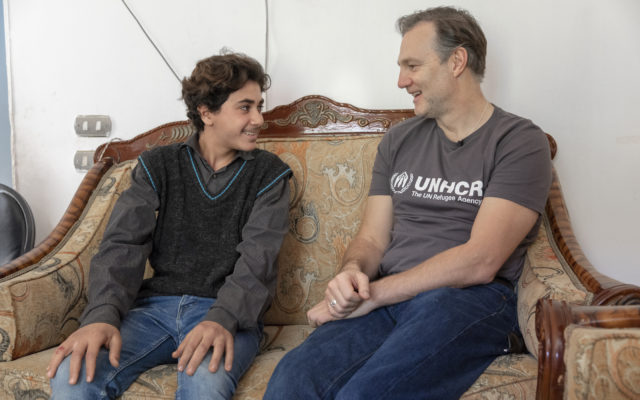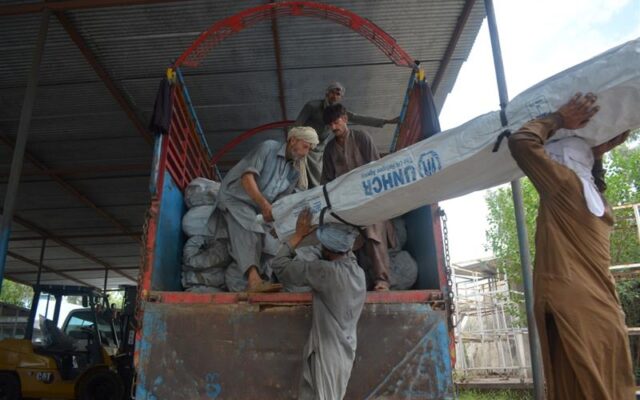“We’re not separate from these crises – they are ours together”
Actor and UNHCR Goodwill Ambassador David Morrissey reflects on his visit to Quetta near the Pakistan–Afghanistan border – where UNHCR is helping families rebuild their lives after catastrophic flooding.
01.05.23
© Andy Hall / UNHCR
Last summer, torrential rains and flash floods swept across Pakistan, devastating local communities, claiming thousands of lives and leaving a third of the country underwater. I’ll never forget seeing the swirling waters and scenes of panic on TV. And recently, I took a three-day trip to Quetta to meet some of those affected – like 67-year-old Haji Khatol Aka, whose home was washed away by the floodwaters.
As we sat together, Haji Khatol told me how he’d arrived in Pakistan four decades ago as a refugee from Afghanistan. He’d made a new life for himself and raised his children and grandchildren in the country. Yet in all that time, he’d never experienced anything like the floods of last summer.

Haji Khatol, 67, tells David how his home was damaged by the 2022 floods in Pakistan. He fled Afghanistan 42 years ago and now lives with 5 of his sons and their families – 62 people in total. UNHCR has provided core relief items as well as cash assistance; which was used to rebuild the external wall (seen here) which collapsed because of the floods. © Andy Hall / UNHCR
“Water was coming from all different directions,” he remembers. “It came in through our front door, two feet deep. The only thing left standing was a door – the rest of our walls collapsed.”
I can’t imagine how it must feel to see your home – indeed, your whole life – just swept away in an instant. All I know is that we must do everything we can to help. Thankfully, Haji Khatol and his family were able to get vital support from UNHCR, including warm blankets and plastic sheeting to protect them from the elements, as well as emergency cash assistance to help them rebuild the walls of their home.
As Haji Khatol told me this, the relief in his voice was unmistakeable and truly moving. It reminded me why I do what I do as UNHCR Goodwill Ambassador. And right now, the need to support organisations like UNHCR is greater than ever – as the number of displaced people around the world soars to more than 100 million. Not since World War Two have so many people been forced to flee their homes because of war and persecution.

Haji Khatol shows David and a UNHCR field officer around his home. © Andy Hall / UNHCR
At the same time, the cost of essentials like food, fuel and fertiliser are spiralling due to the war in Ukraine, putting additional pressure on our already over-stretched aid budgets. More funding is urgently needed if UNHCR is to keep all its programmes running and help all those in urgent need – in Pakistan and across the world.
Over the course of my trip to Quetta, I was lucky enough to see some of this work in action and witness the impact it’s having in refugee communities. At a busy textile workshop for Afghan women, amongst the clatter of looms and sewing machines, I met 25-year-old Khadija, who was learning how to weave carpets. She’s never been to school or had the chance to learn a trade before. But thanks to UNHCR, she has newfound skills, a loom of her own to work on and a way to make an income for life.

The carpet-weaving and machine embroidery project set up by NAMA in collaboration with UNHCR since 2020 has supported 100 women, 70% of whom are Afghan refugees who are now trained in Pakistan-certified advance level carpet-weaving. © Andy Hall / UNHCR
Similarly, at the University of Balochistan, I spoke with Afghan students studying medicine and education on a scholarship programme funded by UNHCR. Their enthusiasm was infectious and their lives will be forever changed by their studies.
Elsewhere in the region, I saw more lives transformed – literally illuminated – by solar-powered lamps that allow families without electricity to work, cook and move around safely when darkness falls. As teacher Abdul Malik explained to me, he no longer has to cut short his marking sessions in the evening and his nieces can do their homework until late – all thanks to these small, simple lights that make an enormous difference.

Afghan refugee Abdul Malik, 29, is a teacher who lives with his wider family, including his mother, two sisters, brother, his brother’s wife and their five children. The household’s lives have greatly improved since they have received a UNHCR solar lamp, as their old lamps were dirty, expensive and inefficient. © Andy Hall / UNHCR
Everyone I met in Quetta was so grateful for the help they’ve been given, but unequivocal that more is needed. Families here have already been through so much, fleeing their homes in Afghanistan and starting from scratch in Pakistan. They’re part of an exodus that began in 1979 when the Soviet0Afghan war broke out, continued through conflict after conflict in Afghanistan and spiked again when the Taliban re-took power in 2021.
For the most part, these refugees have been treated with enormous generosity and compassion by the Pakistani Government, which has included them in its national systems and offered them healthcare and primary education on a par with locals.
But there was no mistaking the poverty of the villages I visited around Quetta, and many of the people I spoke to told me of the lack of essential services in refugee communities.
Of course, Pakistan has its own economic and environmental challenges to deal with. It ranks in the world’s ten countries most vulnerable to climate change. And when disaster strikes, it’s always the poorest and most vulnerable who are hardest hit. Which brings me back to Haji Khatol and the thousands of refugees devastated by the floods last summer.
What these families have been through is not just a local or national crisis – it’s a global one, brought on by climate change and increasing refugee numbers. Here in the UK, we might be far away geographically, but we can’t separate ourselves from these kinds of crises – they are ours together. We all have a responsibility to take action and show support as best we can. We owe it to people like Haji Khatol.




